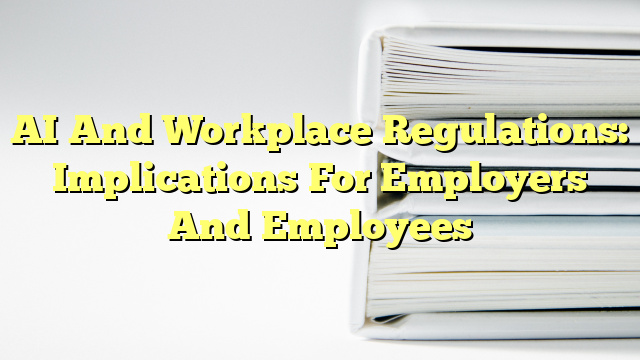Table of Contents
- Introduction
- Implications of AI in the Workplace
- Impact of Artificial Intelligence on Employment and the Workforce
- Pros of Artificial Intelligence in the Workplace
- Cons of Artificial Intelligence in the Workplace
- Conclusion
Introduction
In recent years, the emergence and rapid development of artificial intelligence (AI) has had an increasing impact on the workplace. Due to its ability to automate vital processes and streamline operations, AI is quickly becoming a part of the modern workplace. As AI technology advances, it is increasingly being used to automate and optimize physical and digital processes.
Implications of AI in the Workplace
One of the most significant implications of AI in the workplace is the potential for job displacement. By automating certain processes, AI technology can reduce the need for human labor and result in job losses. Additionally, AI can improve decision-making processes and eliminate the need for human judgment in certain scenarios, which could lead to further job displacement.
Another implication of AI in the workplace is the potential for increased pressure on employees. With AI automating some tasks, employees may be expected to complete tasks at a faster rate or with higher accuracy, which could lead to higher stress levels. Additionally, employees may feel that their job security is at risk as AI technology continues to develop.
Impact of Artificial Intelligence on Employment and the Workforce
As AI technology continues to develop, its impact on the workforce will be significant. AI technology is expected to increase the efficiency and effectiveness of certain processes, which could lead to higher output and higher profits for employers. However, AI could also lead to job loss and displacement, which could have a negative impact on the workforce. AI technology could also lead to a shift in job roles, as certain tasks are automated, and new roles are created to manage the AI technology.
Pros of Artificial Intelligence in the Workplace
The introduction of AI technology into the workplace has numerous potential benefits for employers and employees alike. AI can automate tedious and repetitive tasks, which can save time and resources, as well as improve accuracy and efficiency. Additionally, AI technology can be used to improve decision-making processes, as it can quickly analyze large datasets and identify patterns that can be used to inform decisions.
AI technology can also be used to improve customer service, as it can automate processes such as customer support and automate customer interactions. Additionally, AI technology can be used to improve safety in the workplace, as it can be used to automate processes that require dangerous or hazardous work.
Cons of Artificial Intelligence in the Workplace
Although AI technology has numerous potential benefits, it also has the potential to create some drawbacks. As AI technology continues to develop, it could lead to job displacement and job loss, as certain tasks and roles are automated. Additionally, AI technology could lead to issues with privacy and security, as AI systems require access to large amounts of data, which could potentially be vulnerable to security breaches or misuse.
Finally, AI technology could lead to ethical issues, as it can be used to automate decisions that involve human judgment, such as hiring or firing decisions. As such, AI technology could lead to ethical issues, such as bias or discrimination, if it is not properly managed and monitored.
Conclusion
AI technology has the potential to significantly impact both employers and employees. On the one hand, AI technology can automate processes, making them more efficient and accurate, as well as improve decision-making processes. On the other hand, AI technology could lead to job displacement, privacy and security issues, and ethical issues. As such, it is important for employers to be aware of the implications of AI technology and

